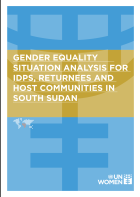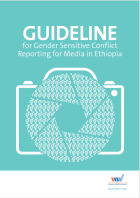1 - 10 of 10 Results
Date:
The United Nations Country Team System-Wide Action Plan (UNCT-SWAP) on Gender Equality Scorecard is an accountability framework that promotes improved planning, coordination, programming, and results for Gender Equality and Women Empowerment at the country level, tied to support for Member States in achieving the Sustainable Development Goals.
Date:
The UNCT-SWAP Gender Equality Scorecard showcases the UNCT’s dedication to promoting gender responsiveness and accountability in implementing Cooperation Framework and its operations, structures, and processes.
Date:
This survey analyses what form of publications are being sought by diverse audiences and how often the publications are consulted by the audiences. It further mapped which parties seek UN Women publications in the region and in what format they preferred.
Date:
This brief emerges from the UN Women East and Southern Africa Knowledge Management Strategy 2022-2025. In the period of the Strategic Note (2018-2021), ESARO leveraged its knowledge management (KM) strategy (2018-2021) and developed KM tools and systems and ensured a systematic approach to KM implementation across the region.
Date:
This Regional Coordination Strategy articulates how UN Women will leverage its unique triple mandate—encompassing normative support, UN system coordination, and operational activities—to mobilize urgent and sustained action to achieve gender equality and the empowerment of all women and girls and support the achievement of the 2030 Agenda.
Date:
As gaps remain in efforts to stem the tide of global economic crises, having fiscal policies in place to safeguard spending for women is essential. Gender Responsive Budgeting (GRB) can ensure a gender-equitable allocation of resources and expenditure tracking to promote gender equality. This briefing note provides information on the foundation established to determine entry points for this work, key partnerships, and plans to advance systemic financing for gender equality in the country.
Date:
The transition to a green economy will create many new jobs around the world, including in sub-Saharan Africa. But will women share-in these new jobs, and will the economic transformation help them move into higher-paid, more stable jobs that require more education and skills? The short answer is “yes” – provided countries adopt strong policies and programmes to make it happen. The green economy transition is attracting attention in policy circles but its potential gender...
Date:
Gender Sensitive Conflict Reporting is not an area well developed in Ethiopia. Conflict reporting has either been gender blind at best, or at worst, perpetuated stereotypes, and harmful narratives. UN Women in collaboration with Ethiopian Media Authority has developed a guideline that will be useful as a reference for journalists working in different media. After the development of the guideline, journalists have been trained and the guideline has been disseminated. It is believed the guideline will help journalists to reflect an accurate portrayal of gender in their reporting. It is also designed as a practical and go-to reference guideline.
Date:
The report provides an assessment of progress made by the 2019 UNCT in Ethiopia in mainstreaming gender in the UNDAF cycle of (2016-2020) and makes concrete recommendations on how the identified gaps can be improved.
Date:
On 25 September On 25 September2015, the United Nations General Assembly adopted the 2030 Agenda for Sustainable Development as the agreed framework for international development. It is the successor to the Millennium Development Goals (MDGs). However, unlike the MDGs, the 2030 Agenda presents a much wider scope by deliberately and more fully incorporating economic and environmental sustainability, as well as the aspiration of many countries for peaceful and inclusive societies.










